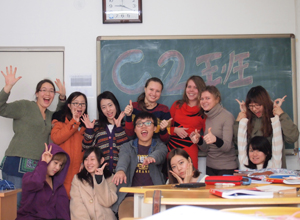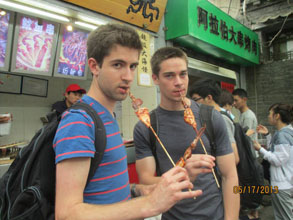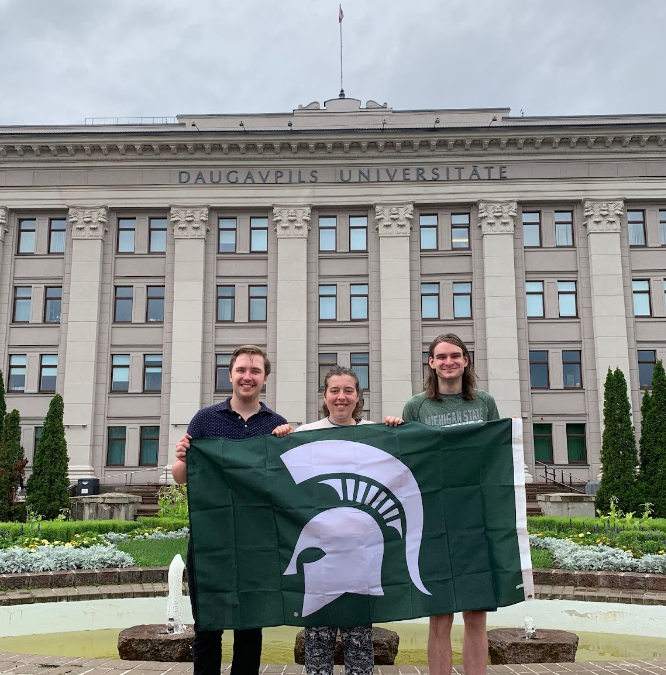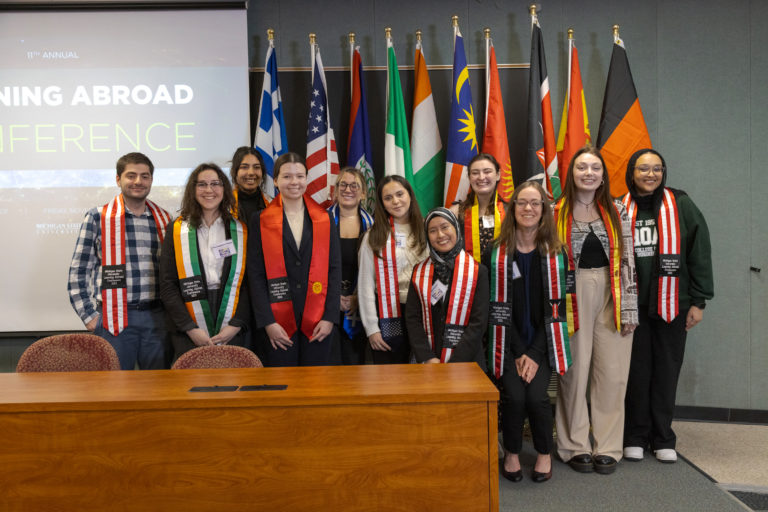Kelly
Chinese Language and Culture in Harbin, China, Summer 2011

My study in China was truly a fantastic experience that I will never forget. I chose to do this program in order to improve my Chinese level and also gain valuable experience living abroad. I felt these two aspects would be helpful in finding a job in the future.
With over 20 hours of language classes a week, this program was very challenging. But the classes were also a lot of fun. My class had students from all over the world including Korea, Russia, Thailand, and Brazil. Very few of them could speak English so the common language spoken among us was Chinese, which at first seemed like a daunting task, but it ended up being very helpful in improving my Chinese. We all became very good friends despite the language barrier.
I also learned a great deal about Chinese culture through tutors we were assigned at the beginning of the program. The tutors were Chinese students attending the university where we studied. They were so helpful in getting us accustomed to our new environment. This really showed me how much the Chinese value showing hospitality toward guests. Another cultural learning experience came when I accompanied my tutor back to his dorm room. He shared an extremely small room with three other students he had been living with for the past three years. I could not believe four people lived in such a small space, but when I saw the roommates talking with each other they all seemed perfectly content with their situation. I could also tell right away they were very close to each other by the way my tutor introduced them. He was so excited to tell me of his roommates’ academic achievements and what they planned to do after graduating. I remember thinking that a room this size with four roommates in a U.S. university would be a disastrous situation. No one would be able to stand each other after a month. But these four Chinese students had been living like that for three years, and they all really enjoyed each other’s company. From this experience in the dorm room I learned how friends in Chinese culture treat each other as if they were family. These four roommates acted like brothers to one another.
Sam Kilberg
Chinese Language and Culture in Harbin, China, Summer 2011
I think the only way you can truly know your own country is to leave it. Americans can be very myopic about their culture and therefore tend to have preconceived notions about things they have no experience with. That and due to the fact that China and the Chinese culture have always fascinated me probably because of my mother’s love of all things Chinese are the reasons I decided to go study abroad in China. I recognized that China is quickly becoming a global entity and knowledge of the language and culture would benefit me in my future endeavors. MSU’s study abroad program is amazing. Even given my financial constraints I knew it was something I had to do to prepare myself for the future. Learning Mandarin Chinese while studying International Relations made me realize how important it is becoming to understand and experience the Chinese culture in order to have the tools to effectively negotiate and work with this rising global power. Looking back, the most beneficial part of studying Chinese in China was that my learning and studying of the Chinese language did not stop as soon as I left the classroom. We were always learning and always speaking Chinese. We had to order food, talk with our tutors and have a conversation with our classmates all using Chinese. Just being in China surrounded by the Chinese culture 24/7 accelerated my learning curve beyond belief. What I will take away from my time spent in China is not to judge a country’s people by those who govern them. This is something very important now and will be for future years to come. When I arrived in China it was a whole new world but I was surprised to notice that the many Chinese college students I met were just like American college students. They would skip class to watch big sporting events and go out to eat with friends. They want the same things in life that many of us want. It was good to know that even though the Chinese culture is so very different from American culture and these two countries are so very far apart from one another the people that inhabit it are in many ways similar. In fact I met and made friends with other students from all over the world and when we went to a bar, out to eat or played basketball we were just college students and friends. I like to think the world could be like this someday.
Clara Balliet
Chinese Language and Culture in Harbin, China, Fall 2012

I spent last fall semester in Harbin, China in a province near the Russia-China border and not too far from North Korea, where negative 20 degrees Fahrenheit in the winter is a little colder than normal. Despite often feeling very foreign and very cold, I look back on my semester abroad and smile, knowing experiences like the ones I had, come only once in a lifetime.
After a couple weeks in class, my professor approached me about tutoring English. I agreed, and a few days later nervously took the bus to my first session with Matthew, a son of my professor’s friend. Soon, I found that not only had I connected with a sweet, silly and often distracted 4-year-old, but also made new friends with the rest of his family.
After every session, his grandmother would invite me to stay for dinner. The first day I struggled through the initial conversation of explaining my vegetarianism, but from then on she always made sure to fill the dining room with the fragrance of chive and onion dumplings, sweet & spicy eggplant, or red bean pastries, among others. Every week the grandfather also gave me a little lesson on Chinese proverbs and I lost count of how many of them referenced food. In China, food is number one.
While I was learning Chinese in class every day, being in their home gave me a space to put my lessons into practice and to connect my abstract notions of culture with a Chinese family deeply rooted in the local culture. Twice a week, I took the short bus ride to their home and I am so grateful for their hospitality and love. In my own family, I have always felt a sense of split culture between my Chinese father and American mother, but in their home, our constant sense of mutual wonder, curiosity, and courtesy gave me a new perspective on my multicultural background. They became my family; I care for them the way I care for my own grandmother. Yet, I was still part foreigner and always had questions bubbling up because I will never completely know the Chinese language and culture. It is at once my own and yet not quite.
During my semester abroad, I learned about the value of connection. In the last few weeks since my return, I’ve begun to put this idea of connectedness to work as I help my mentor develop her new financial consulting business. I see how important it is that she is completely enmeshed and in touch with our community. While I was in China, I certainly improved my Chinese by leaps and bounds, but those improvements were simply a vehicle for the truly meaningful aspect of my time in China. The people I connected, spent time, and laughed with really embody what I want to take away from this experience.
Brad Seegert
Chinese Language and Culture in Harbin, China, Summer 2013

My study abroad experience in Harbin this summer was nothing like I imagined it would be, granted I didn’t really know what to expect in the first place. Not only was I able to travel outside of the country for the first time in my life and see all the famous tourist sites in Beijing and Shanghai, but I also experienced first-hand the lives of college students halfway around the world. From a language learning perspective, being completely immersed in the foreign language is the fastest way to learn. Studying in a country where the language is spoken allows you to see how certain phrases and words learned in the classroom are actually used in daily life, which is the only way to completely understand and learn a language. What will always stand out the most to me about the experience, however, is what I learned about the culture, and a way of life that is very different from mine in America, but at the same time surprisingly similar. China’s rich cultural history, along with codes of honor and fortune, is very much alive today, but on campus Chinese students spend their time studying math and sciences, hanging out with friends, and playing basketball. One thing I discovered while in Harbin is that younger Chinese people love basketball. From morning until night, the campus basketball courts would be packed with students. A few of my Chinese friends got me into a game, and although their style of play is different from what I’m used to (they rarely take 3-point or even mid-range jump shots…which unfortunately is my whole offensive game) they are largely influenced by the NBA, and know all the stars. The cafeterias were packed when the NBA finals came on. While playing sports with a group of people who don’t speak your language, you often have to rely on other ways of communication, and the fact that we, from opposite sides of the world, were able to effectively play a sport that we love was amazing to me. It makes the world seem smaller, and showed me that despite seemingly vast cultural differences, we’re not that different after all. And, of course, I was able to learn basketball terminology in Chinese, something that unfortunately is not taught in the classroom. I had so many great experiences and met so many great people during my ten weeks in China, and although this particular program was a ton of hard work and definitely not a vacation, I wouldn’t have had it any other way. I could sit in classrooms learning Chinese for the rest of my life and not have the understanding of the culture and daily life that I now have, and that is truly why this study abroad was something I’ll remember for the rest of my life.
Zandra Russel
Language and Culture in Harbin, China, Summer 2013

I was anxious going to China, as I had no idea what to expect from China and its citizens. Despite studying Chinese for two years, the only thing I had really thought about China before leaving was that the government was intimidating. I had never thought about how people live their day-to-day lives, which would have been useful to know beforehand.
However, after getting used to China and its unique culture, I was able to enjoy my explorations of China. My favorite discovery was that many people go outside in the evening and enjoy being outside. There was a park near my dorms, and the walk there was as enjoyable as spending time there. After dinner, I would go for walks with both my American and Chinese friends.
One night, my friend from Michigan State University and I were out walking and we came across a large group of elderly people dancing for exercise. It was fascinating, as that is something I have not witnessed in America, whereas it seems to be a common practice throughout China. There were probably 50 to 100 people in a circle, with about twenty people standing outside the circle and dancing in place. My friend and I decided to join the people on the outside dancing, and it was awesome being able to do a little bit of exercise outside in the open with a large group of other people. The majority of the people in the circle were women, but there was one man who walked around and his enthusiasm was engaging. After we were finished, we walked some more and found other groups of people singing, doing tai chi, and one time we even saw people doing ballroom dancing. While we were walking the Great Wall, my friend and I were resting after climbing a particularly difficult part of the Wall when a family stopped and talked to us. While conversing, we discovered that the elderly lady in the group was 100 years old and I was astonished. After discovering that elderly people in China are able to spend so much time outside exercising, I understand how that is possible.
While walking with my Chinese friends, I learned a lot about the Harbin area and was able to see parts of Harbin I would not have been able to find on my own, such as other universities in Harbin, as well as a little outdoor exercise area. My friends also shared some historical history, such as how the area surrounding the university used to be a zoo until the government sold the land to the university.
Walking around campus was fun after 5:00 because there were lots of children running around, people walking their dog, and people playing badminton. Harbin Institute of Technology was not that big, but outside was always full of energy. Michigan State University is huge, but I feel like the only people that you see outside are students commuting from one place to another or participating in a club, and it doesn’t have the same energy.
Bethany Zimmerman
Chinese Language and Culture, Harbin, China, Summer 2015

During my eight weeks studying at the Harbin Institute of Technology in Harbin, China, I slowly grew the confidence to make more attempts to figure out how to say the names of different foods so I could finally order them by myself. One food in particular that I liked and that I began to eat every morning is called jianbing—a thin pancake material wrapped in the shape of a taco with fried flower, various meat sausages, and vegetables packed inside with a sweet and sometimes spicy sauce in it. At first I had no idea about how to pronounce the five different types they could make, and I spent at least ten minutes with my dictionary trying to figure it out before I decided to try and just ask for the one I wanted by saying the price; all five were different prices. It worked, and after listening to what other people said I eventually learned that most people ordered the jianbing in that way. I ordered the same thing every morning. One day, the owner of the shop asked me in Chinese: “Do you want the same thing as usual?” before I could say what I wanted. It was embarrassing to know that I had become such a regular customer, but it was also at that moment that I realized I had been there for a long time and was finally becoming constant part of the environment in Harbin. I was started running into friends and other people I knew when walking around campus, as well. On top of that, I knew more about Harbin and interesting places to go, while my Chinese friend who had been at HIT for almost a year hadn’t been to any of those places. Though my time in Harbin was short, but it was enough to begin to immerse myself into the community, and to gain the confidence to use Chinese to speak with people, and to figure out ways to get what I needed.
Kathryn Portelli
Chinese Language and Culture, Harbin, China, Summer 2015

I initially chose to study abroad in China in order to gain skills relevant to the career path I am interested in. After graduating from MSU, I want to be accepted into the Peace Corps and the State Department after that. Familiarity with long term travel, the ability to acquire difficult languages, and international experience are all assets that will help me achieve those goals. When I was accepted to this program I knew I would improve my resume, but I believe my study abroad experience gave me even more than that. Studying abroad in China let me use my Mandarin, allowed me to meet some wonderful people, and helped me to become a much more flexible and open-minded person.
My ten weeks in China drastically improved my fluency in Mandarin. I was able to devote my full time to formally studying the language as well as using it in my daily life. By the time I left, speaking Chinese felt comfortable. Being surrounded by English when I returned home was odd! I know having experience in Mandarin, a notoriously difficult language, will be impressive to future employers. Not to mention that learning Mandarin allows me to speak to millions of people I couldn’t communicate with before. With even my basic language skills, I met dozens of interesting people during my stay in Harbin. I was pleasantly surprised by how easy it was to make friends when I left my comfort zone and strived to practice my Mandarin. My ten credits of Chinese classes taught me grammar, but the friends I made helped me to understand colloquialisms, pop culture, and daily life. The time I spent in China gave me a deeper understanding of the Chinese people and their culture. Study abroad was an extremely valuable experience for me as a language learner, and I would recommend it to any language student.
Some memories of China are especially vivid: bright little dragon kites flying from overpasses in the Beijing smog, the lively overpowering buzz of cicadas in Shanghai, the heat of a bowl of spicy-soup from my favorite shop in Harbin. But the things that affected me the most were intangible: I gained confidence, friendships, a broader worldview, better communication skills and so much more. I’m grateful for my time in China. Beyond strengthening my resume and speeding my language acquisition, I know that my study abroad experience helped to make me a better person.


